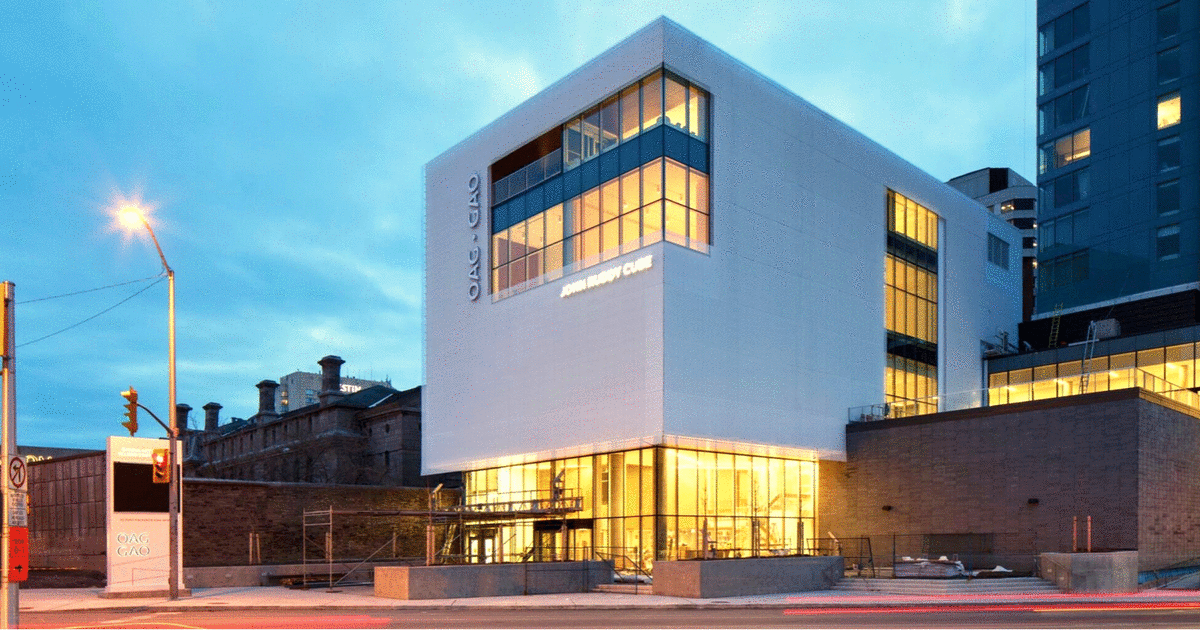In downtown Ottawa, at the point where the Mackenzie King Bridge empties onto Waller Street, sits the redeveloped Ottawa Art Gallery (OAG). A clean white cube cut by plenty of glass, its design screams there is art in here. It is impossible to miss, and luminous at night.
It’s the crowning jewel within the local arts court – a cluster of facilities housing some 14 organizations, including several festival headquarters and a music school. The arts court has been there for ages, but I am used to it looking ramshackle and worn. My son’s first dance recital was there in one of the theatres. They were dressed in robot costumes and did a hip hop routine to “Video Killed the Radio Star.” The stark new OAG is a sign of things to come. So is the private-sector side of the redevelopment deal. The now 55,000 square feet of OAG space, which include a rooftop terrace and a swish café-slash-bar, are joined on the site by a revamped boutique hotel and a new chic condominium tower. The project’s price tag was around $100 million, with a considerable portion, more than a third, funded by government. One is tempted to ask: Why does the City of Ottawa care so much about this thing?
It cares because of Rideau Street, downtown Ottawa’s central thoroughfare, a stone’s throw from the gallery. Ottawa is Canada’s capital city, and in the eyes of policymakers and business owners there have long been too many poor and homeless people in key tourism and shopping districts – among them the Byward Market, where Barack Obama once enjoyed a baked good, and the buildings of Parliament. I’ve been hearing this conversation since I first moved to Ottawa in 2009, and lived in a rented apartment downtown. How can the city “fix” Rideau Street?
They have complained especially about the central downtown location of the Ottawa Mission, a homeless shelter right across from the OAG. The Salvation Army shelter, a few blocks to the north, is being pushed out to a new location in Vanier, a neighbourhood just east of downtown. Vanier has a bad reputation. The crime rates are higher. Storefronts are run down. There are downmarket businesses, like pawnshops and payday loan franchises. The property values are lower. Even there, though, homeowners are putting “SOS Vanier!” and “No to the Salvation Army!” signs on their lawns. They claim the shelter will “set Vanier back ten years.” A movement of local business owners would like to see the Ottawa Mission follow the Salvation Army out of the downtown core. They describe its presence as a “cancer.”
One sees a vision of their preferred future in the theatre space on the OAG’s third floor, in Douglas Coupland’s monstrous collaboration with Simons, a Canadian fashion retailer, titled The National Portrait. This artwork, for lack of a better word, is a collection of crowd-sourced 3D printed portraits, whose faces are “looking forward towards both the sun and the future.” Coupland stated that this piece “hijacks the aesthetics of retail display,” which I guess is one way of saying that it builds a fashion retailer’s brand while securing it a tax rebate. The portraits are of people who volunteered to be scanned at Simons stores, excited at the prospect of featuring in the work of one of Canada’s few art celebrities. As it happens a flagship Simons location recently opened at the upscale shopping mall beside the OAG, to much fanfare. You can even spot their sign from a courtyard off the theatre. A coincidence.

If you stop in one of the gallery’s entranceways, you find a folksy wooden sculpture of the Queen of England, kneeling to kiss your hand. Acadian Queen, it’s called. The description tells us it is about Acadians refusing an oath of allegiance to Britain in 1755 and then suffering “violent expulsion.” Acadians are invited now to flip the script, give her their hands to kiss, and bid her kneel before them. My 8-year-old son enjoyed posing regally with his hand in hers. “Oh, do kiss my hand,” he said in his best British accent.
 Sarah Brouillette
Sarah Brouillette
My son understands irreverence. It was harder to explain to him the striking dissonance between the message of the artwork and the actual effects of the building we were standing in, whose opening Acadian Queen was commissioned to celebrate. These purpose-built enclaves concentrate art types in targeted areas. Property values rise, pushing homeless and poor people out to the peripheries. It’s a familiar story. This too is an expulsion. That’s what the city offered such handsome funding for. Art space! Face the sun, face the future! But do it without affordable housing.
Even if the Ottawa Mission stays put, the OAG expansion is doing its job. The Acadian Queen would like us to place bowing to authority firmly in the past, as something we can now laugh about and celebrate our triumph over. It is us who are now in the position of the power, Except – who is us? Why, the consumers of art! We are the new royalty. As we face the sun and face the future, the Queen’s kiss thanks us for our service.
Admission is free.





